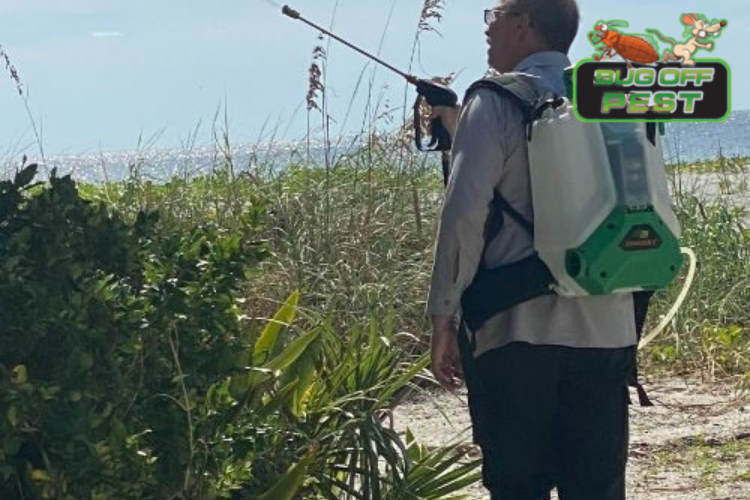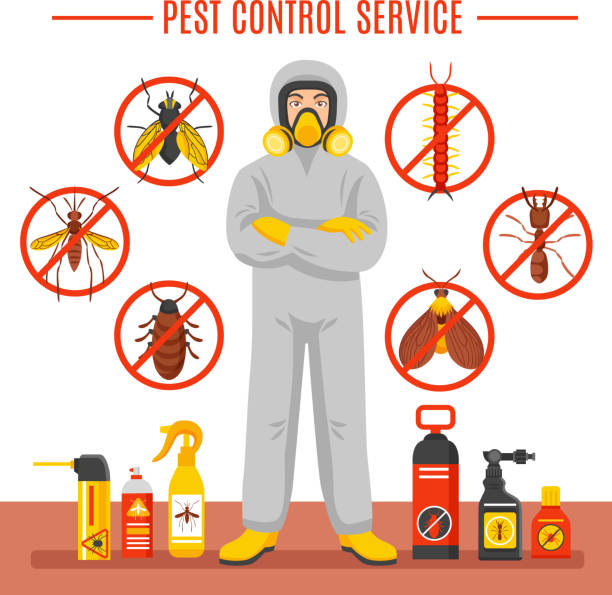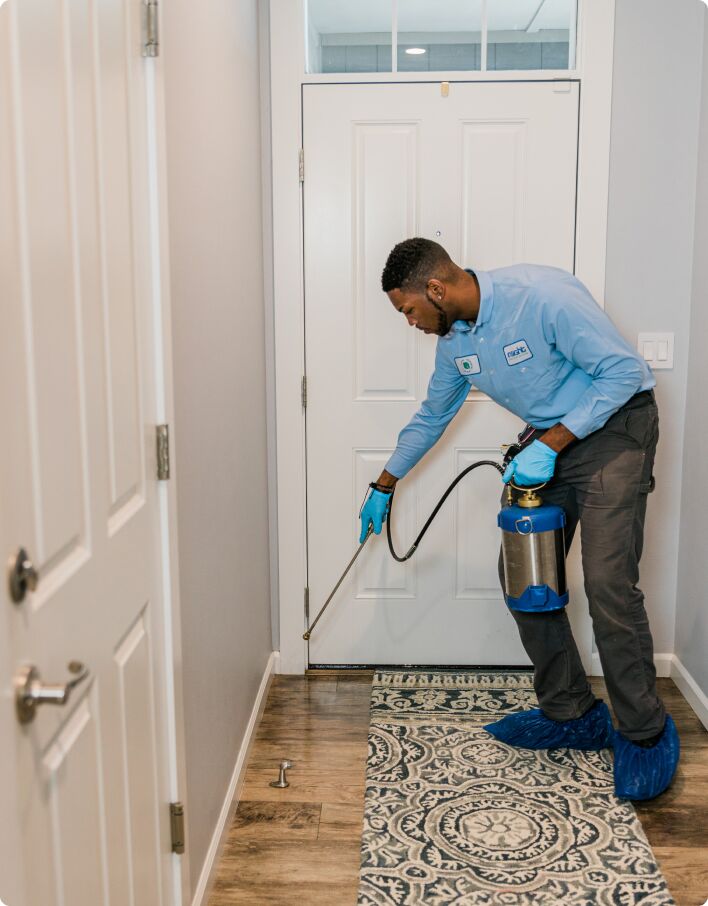Complete Pest Control Services to Protect Your Business in Port Charlotte
Learn More About the current Advances in Insect Control and Exactly How to Carry Out Effective Treatment Solutions
Recently, the area of bug control has actually experienced considerable innovations, driven by the demand for reliable and sustainable treatment services. Ingenious techniques such as Integrated Bug Administration (IPM) integrate eco-friendly practices with advanced innovation, improving both efficacy and environmental responsibility. The integration of clever modern technologies and Do it yourself approaches has empowered people to take on bug concerns more effectively. As we discover these advancements, it becomes vital to recognize exactly how best to apply these approaches in different settings to achieve optimum results. The implications for parasite administration methods could be transformative.
Eco-Friendly Pest Control Options
In recent times, the need for green parasite control options has actually risen as homeowners and companies alike look for sustainable options to standard chemical therapies. This change is driven by expanding ecological understanding and a need to minimize the health risks connected with synthetic pesticides.

Eco-friendly pest control approaches include a series of techniques that prioritize the usage of natural substances and techniques. Integrated Bug Administration (IPM) is one such method, combining organic, cultural, and mechanical methods to handle insect populations while lowering reliance on chemicals (Wildlife removal services). This holistic technique emphasizes avoidance with habitat control and the introduction of all-natural predators, therefore cultivating a well balanced ecological community
One more preferred option is using organic pesticides stemmed from plants, which tend to be less unsafe to non-target microorganisms. Products like neem oil and diatomaceous earth have actually gained traction for their effectiveness in regulating parasites while presenting marginal risks to human wellness and the setting.
Furthermore, exemption techniques, such as sealing access factors and preserving cleanliness, play an important duty in environment-friendly parasite management. By taking on these sustainable methods, companies and people can efficiently take care of parasites while promoting a healthier world for future generations.
Smart Innovation in Pest Administration
Technology is improving the landscape of parasite management, with smart technology becoming a critical force in improving effectiveness and performance - Wildlife removal services. The combination of Net of Points (IoT) tools, artificial knowledge (AI), and data analytics is reinventing just how pest control experts approach infestations
Smart traps geared up with sensors can detect parasite activity in real-time, sending prompt signals to operators. This permits prompt responses, minimizing damages and reducing the need for comprehensive treatments. Additionally, AI formulas assess historic information to anticipate insect behavior, enabling aggressive interventions based on environmental problems and invasion patterns.
Drones and automatic vehicles are also playing a considerable function in pest monitoring, supplying aerial assessments of large locations, determining hotspots, and even dispersing targeted therapies. These technologies not only simplify procedures but additionally enhance safety and security by restricting human direct exposure to potentially harmful chemicals.
In addition, mobile applications equip consumers to keep track of pest task and access specialist guidance, cultivating a joint technique to pest management. Generally, the adoption of wise technology is establishing a new criterion in insect control, stressing data-driven decisions and lasting methods that ultimately profit both professionals and house owners alike.
Integrated Bug Management Methods
Integrated Pest Administration (IPM) employs an all natural approach to pest control, integrating numerous techniques to successfully manage pest populations while lessening threats to human health and the atmosphere. IPM rotates around comprehending the pest life cycle, their all-natural enemies, and the ecosystem in which they grow.
One of the basic components of IPM is keeping track of pest populaces with normal evaluations and information collection. This enables the identification of parasite limits, determining when intervention is essential. Cultural practices, such as crop environment, cleanliness, and rotation control, are essential in reducing pest occurrence and promoting plant wellness.
Mechanical controls, including obstacles and catches, are additionally crucial in IPM. These approaches can literally eliminate or prevent parasites without the usage of chemicals. When needed, the sensible application of chemical controls is utilized, concentrating on targeted treatments that lessen ecological effect.
Education and cooperation amongst stakeholders, including farmers, parasite control specialists, and the neighborhood, are vital for the successful implementation of IPM strategies. By prioritizing lasting practices, IPM not just addresses pest problems but additionally promotes a healthier ecosystem.
Biological Control Approaches
Many biological control approaches are increasingly recognized for their performance in handling pest populaces while promoting environmental balance. These strategies harness all-natural predators, bloodsuckers, and pathogens to minimize pest numbers without counting on artificial chemicals. The intro of ladybugs can efficiently control aphid populations, while nematodes target soil-dwelling pest larvae.
Furthermore, the use of microbial pesticides, such as Bacillus thuringiensis (Bt), supplies an eco-friendly alternative for handling caterpillar pests. These items especially target pest species, decreasing harm to helpful insects and pollinators. Furthermore, conservation biological control emphasizes improving habitats for all-natural adversaries, such as birds and useful pests, thus urging their existence in farming systems.
Research continues to expose cutting-edge approaches within this field, such as using pheromones to interfere with pest mating patterns or the advancement of biocontrol representatives via hereditary design. Executing these techniques can cause lasting parasite monitoring techniques that mitigate the reliance on chemical interventions, ultimately fostering healthier environments. As recognition of these strategies expands, they are coming to be integral components of incorporated bug monitoring (IPM) approaches, offering an equilibrium in between reliable pest control and environmental stewardship.
DIY Pest Control Solutions
As property owners seek effective ways to take on bug concerns, do it yourself parasite control solutions have obtained appeal for their access and cost-effectiveness. These techniques equip individuals to deal with invasions using conveniently available products and strategies, often without the demand for professional treatment.

Additionally, maintaining proper hygiene and normal assessments can stop bug entrance and nesting (Wildlife removal services). Basic practices, such as sealing splits, eliminating food sources, and decluttering, can significantly reduce insect populations. Catches, both homemade and readily available, can also supply reliable options for tracking and controlling certain insects like rodents or pests

Final Thought
The combination of environmentally friendly insect control index options, clever modern technology, and ingenious administration strategies offers a detailed strategy to effective bug monitoring. By accepting Integrated Insect Management (IPM) and making use home pest control spray of biological control methods, along with DIY solutions, accountable and lasting bug control can be achieved. These advancements not just enhance the performance of bug management techniques however additionally contribute to a much healthier atmosphere. Executing these strategies cultivates a balanced ecological community while efficiently resolving pest populations.
Environmentally friendly bug control approaches encompass a range of methods that prioritize the use of natural compounds and techniques. Integrated Parasite Management (IPM) is one such method, integrating organic, social, and mechanical tactics to manage insect populaces while lowering dependence on chemicals. As recognition of these techniques grows, they are ending up being important elements of incorporated parasite management (IPM) strategies, supplying a balance between effective insect control and environmental stewardship.
The integration of eco-friendly insect control options, wise modern technology, and cutting-edge monitoring strategies offers a comprehensive approach to reliable pest management. By embracing Integrated Parasite Monitoring (IPM) and making use of organic control techniques, alongside Do it yourself solutions, accountable and sustainable like it pest control can be attained.